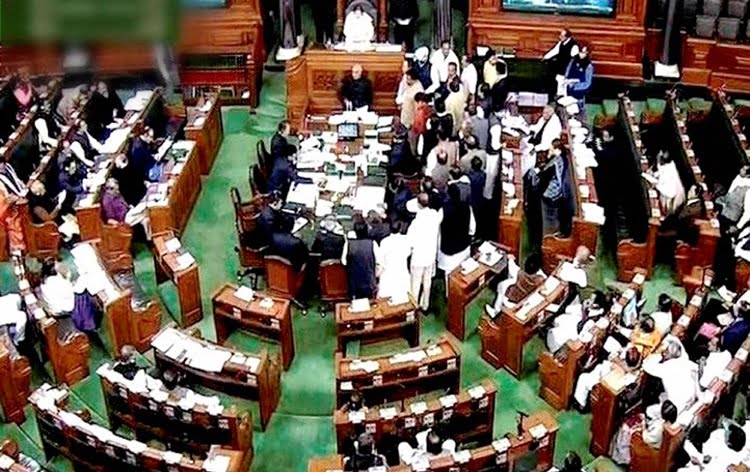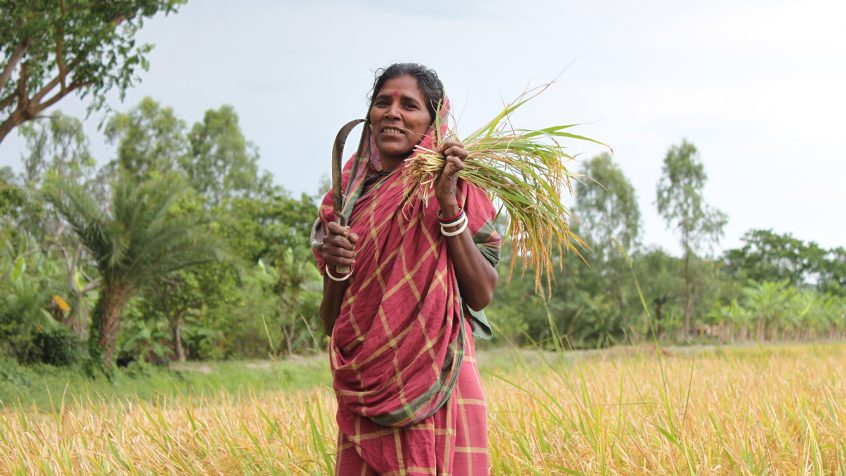Statement by LABIA: A queer feminist LBT collective
Last week, it felt like the Lok Sabha was on a spree of passing dangerous bills. Three Bills in particular – namely The Transgender Persons (Protection of Rights) Bill, 2018, The Trafficking of Persons (Prevention, Protection and Rehabilitation) Bill, 2018, and The Surrogacy (Regulation) Bill, 2018 – have been so poorly drafted that all of them further marginalise the very people they were supposed to safeguard. The provisions in all three bills display a complete lack of comprehension of the lived realities of the people for whom they are meant – transgender persons, sex workers, bonded labourers, contract workers, domestic workers, migrant workers, and surrogates.
The trans and queer communities that are affected directly or indirectly by all the three bills have raised their voices against the first two bills along with sex workers’ groups and other like-minded people working with a rational approach to addressing the issue of trafficking. As LABIA – A Queer Feminist LBT Collective, we are part of these protest voices across the country. We also equally and vehemently oppose the Surrogacy Bill and ask that the Rajya Sabha send each of these Bills to a select committee.
Laws in each of these areas are not unwelcome. They, however, have to be aligned to the protection of the rights and lives of those marginalised by the dominant structures of society. These three Bills, on the other hand, seem to be made such that the majoritarian structures of society are protected, and the marginalised populations are made more vulnerable in an already unequal society.
It is not surprising that this governement controlled by the Sangh Parivaar should be passing these three Bills reinforcing – and thereby forcing on us all – its multiple dangerous agendas.
1. A clear rejection of the idea of self-determination.
The SC judgment in NALSA 2014 showed that self-determination was a value upheld by our Constitution and its principles of justice and equality. But here we have the State ignoring these Constitutional values and denying this right, while policing and regulating different aspects of our lives – what genders people can choose (Trans Bill), what labour people can do and where (all three Bills), and what kind of families people can make or not make (Trans and Surrogacy Bills).
2. Adult people, especially those marginalised by gender and sexuality, must not be given autonomy over their own lives.
They must, instead, be under the control of their families, and hence have to be repatriated to them, or kept under the vigil of the State – which, too, sees its role as governed by notions of the heteronormative family and not the Constitution giving equal rights to all citizens (Trans and Trafficking Bills).
3. A family may only be formed within heterosexual marriage and through the maintenance of the purity of caste norms.
This Sanghi government does not see any problem in bad-mouthing widows or in denying access to families of choice to all those who are not married for whatever reason, thus creating a hierarchy of citizens (Surrogacy and Trans Bills).
What else can we expect from a Government that has been flouting every Constitutional value and advocating for a Hindu code of conduct! As queer people, we stand in opposition to this blatant disregard of the principles of diversity and plurality. We do hope that this massive attack on the most marginalised done under the garb of protecting their rights get a befitting reply in the next election.
We call upon the opposition parties to garner their strengths to defeat these Bills in the Rajya Sabha. We also demand from all political parties an electoral commitment to the concerns of those from the margins – to consult with us before making further legislations that could end up affecting our lives adversely, and in such obviously discriminatory and violent ways.
The Transgender Persons (Protection of Rights) Bill, 2018 in its current form is more accurately The Transgender Persons (Violation of Rights) Bill, 2018.
- In spite of repeated demands from the transgender community, the Bill still includes the problematic provision of District Screening Committees. Under this, transgender persons will need to get their gender identity certified by committees with members from the legal and medical fraternities. Additionally, those of us who require either Male or Female gender markers on our documents, rather than Transgender, will need to undergo compulsory medical interventions. This is a violation of the Supreme Court judgment in NALSA vs UoI (2014), which upheld our right to self-determination of gender, without compulsory medical interventions.It criminalises organised begging without providing any opportunities in education, employment, or healthcare.
- It tells us that our lives matter less than cisgender lives by imposing much lighter punishments for assault on or discrimination against us. This is against our constitutional right to equality.
- It criminalises organised begging without providing any opportunities in education, employment, or healthcare.
- It violates our right to live and move freely by telling us that even as adults, we must either live with our natal families or approach a court. It does not recognise the fact that natal families are, at times, sites of extreme violence for us.
- It claims to provide a way to end discrimination against transgender persons, but neither does it define what constitutes discrimination, nor does it provide any remedial instructions.
The Trafficking of Persons (Prevention, Protection and Rehabilitation) Bill, 2018 is an equally regressive piece of legislation that, if allowed to pass, will cause serious harm to communities that are already marginalised.
- It uses the failed approach of institutionalised rehabilitation uncritically, even after the recent disclosures of widespread sexual abuse of women and girls in various state- and NGO-run ‘protection’ homes. It empowers Magistrates to pass orders for detaining adult victims in ‘protection’ and ‘rehabilitation’ homes, without a hearing. It does not even stipulate a maximum time period for such detention. No review or appeal against such orders is provided for. The persons accused of the crime will have the right to be produced in court and meet their family, but the victims of trafficking are not even afforded that much.
- It has an unclear relationship with existing laws in the country. Sections 370 and 370A of the IPC already penalise trafficking and sexual exploitation of trafficked victims, respectively. In that sense, this bill is not just redundant, but will cause unnecessary confusion. The relationship of this bill with several other laws such as the Immoral Traffic Prevention Act, laws on bonded labour, the Juvenile Justice Act, and others, is also unclear. In addition, key definitions for terms such as forced labour are missing from the bill.
- It vests excessive powers in the Police, and creates several bureaucratic institutions with no accountability. For instance, under Section 16(1), police can rescue and remove ‘any person’ from ‘any premises’.
- It contains several vague and overbroad provisions that will end up further hurting already marginalised communities, such as sex workers and transgender persons. It compounds the criminalisation of transgender persons by providing a staggering 10 years of punishment for organised begging. It also fails utterly to distinguish between voluntary sex work and trafficking, thereby violating the agency of sex workers.
- Several provisions of this bill also go against the tenets of the Indian Constitution as well as of our criminal justice system. It has an illogical gradation of vaguely worded offences, lacks a clear sentencing policy, and offers weak punishment to employers. It also reverses the burden of proof by assuming guilt rather than innocence.
- It is against international human rights norms. Even though it claims to be in compliance with the 2002 OHCHR Recommended Principles and Guidelines on Human Trafficking and Human Rights, it continues to deviate from these in several respects by looking at trafficking only from a criminal law perspective, and lacking a human rights- based approach.
The Surrogacy (Regulation) Bill, 2018, with its proposal to ban commercial surrogacy, is yet another example of how out-of-touch with ground realities our lawmakers are. It puts a complete ban on commercial surrogacy and allows only ‘ethical’, altruistic surrogacy (by virtue of being non-commercial, altruistic surrogacy is presumed to be ‘ethical’). In the name of regulating surrogacy to curb the exploitation of surrogates and of children born through surrogacy, what this Bill in fact does is curtail the rights of women surrogates.
- Here, the basic but flawed assumption is that by removing the ‘commercial’ component, exploitation will be curbed. Thus, the solution provided is to move towards “ethical” altruistic surrogacy where a surrogate (who has mandatorily to be a married woman with a biological child of her own) must be a ‘close-relative’ (this term is not defined further) of the intended couple, and provide surrogacy service free-of-cost. Given how much pressure marital, also natal, families exert even for traditional pregnancy, did the government really expect women won’t be forced into being surrogates against their will? There is no recourse against such coercion and family violence in the Bill.
- As per the Bill, the child must not be a genetic descendant of the surrogate — thus, even though she is fertile, the surrogate may not undergo much simpler Artificial Insemination but will have to go through complex medical procedures like embryo transfer, meant for those who are unable to carry a pregnancy without intervention. In other words, women must undergo all the trials and tribulations of highly invasive medical procedures, purely out of love and compassion.
- It prevents the surrogates from getting paid for their labour. When everyone else involved in the process gets paid for what they do, why expect just women to be altruistic about it? Is that not exploitation in itself? Why force women alone carry the burden of altruism?
- While the Bill takes away the agency of women to decide whom they might wish to be surrogates for, it also excludes many persons from accessing surrogacy services, by saying that such services will only be available to Indian married couples who have been married for over 5 years and do not have a child of their own. This means that all those who are not married – single people, live-in couples, those who cannot get married, trans or queer persons or couples – cannot access surrogacy. This is highly discriminatory.
- Years of experience show that blanket bans do not curb but actually increase exploitation of marginalised persons by creating underground markets. Instead, if the lawmakers really wanted to end exploitation, they should have provided clear guidelines for taking care of surrogates in terms of their medical and legal rights.
We are all equal citizens in the democracy we live in, and should be treated as such. We urge the Rajya Sabha MPs to take our demands into consideration and reject all the three Bills, and send each to a select committee!
Featured Image Source: News On AIR
About the author(s)
Guest Writers are writers who occasionally write on FII.





Governments should stop pretending that they own us. They do not own people. They are simply our representatives operating on our behalf.